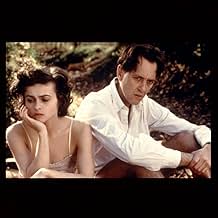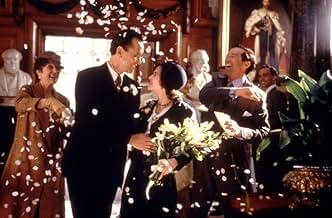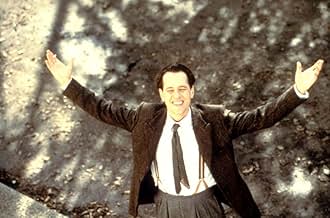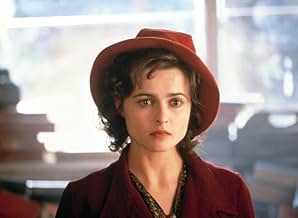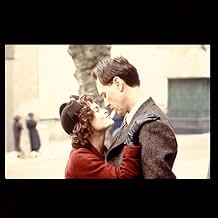IMDb रेटिंग
6.3/10
1.6 हज़ार
आपकी रेटिंग
अपनी भाषा में प्लॉट जोड़ेंGordon Comstock quits his job at an advertising agency in order to write poetry, only to find that poets, like everyone else, need money.Gordon Comstock quits his job at an advertising agency in order to write poetry, only to find that poets, like everyone else, need money.Gordon Comstock quits his job at an advertising agency in order to write poetry, only to find that poets, like everyone else, need money.
- निर्देशक
- लेखक
- स्टार
- पुरस्कार
- कुल 1 जीत
Barbara Leigh-Hunt
- Mrs. Wisbeach
- (as Barbara Leigh Hunt)
फ़ीचर्ड समीक्षाएं
KEEP THE ASPIDISTRA FLYING is a novel by George Orwell , a novel that is in many ways the author's autobiography . There's a problem in that since it mirrors the life of a litery giant it becomes sacrilege to modify it , I couldn't help thinking that perhaps the story could have been updated to a very late 20th century setting
On second thought perhaps not since 1930s London being replaced by 1990s LA with the plot centering on a young screenwriter wanting to break into the Hollyloot system does seem like sacrilege even if it would have increased the box office takings considerably , and as it stands I'm sure we can all relate to Gordon Comstock in someway , he is after all a frustrated poet with no money while most of the people who come to these pages are frustrated film critics with no money
That's where much of the enjoyment of this film lies , we understand the fiery but naive idealism and optimism of Gordon as he tries to get his foot inside the publishing door only to be met with frustration . Richard E Grant might be playing a similar role to the one in WITHNAIL AND I but he is fairly good in these self centered type roles
A fairly entertaining film about the hit and miss nature of writing for a living , though perhaps it appeals more to critics than to a mainstream audience
On second thought perhaps not since 1930s London being replaced by 1990s LA with the plot centering on a young screenwriter wanting to break into the Hollyloot system does seem like sacrilege even if it would have increased the box office takings considerably , and as it stands I'm sure we can all relate to Gordon Comstock in someway , he is after all a frustrated poet with no money while most of the people who come to these pages are frustrated film critics with no money
That's where much of the enjoyment of this film lies , we understand the fiery but naive idealism and optimism of Gordon as he tries to get his foot inside the publishing door only to be met with frustration . Richard E Grant might be playing a similar role to the one in WITHNAIL AND I but he is fairly good in these self centered type roles
A fairly entertaining film about the hit and miss nature of writing for a living , though perhaps it appeals more to critics than to a mainstream audience
No one is better at pontificating while poking fun at themselves than the English, and if you enjoy that sort of thing, this movie is definitely worth watching. Along the way you get to sneer at wealth, poverty, capitalists, communists, the bourgeoisie and proletariat, business, respectability, advertising, poetry, bookstores and readers, hardy plants, loathsome but endearing friends, parasitic siblings, impatient lovers, and self-delusion. All of this comes with an intelligent script, quality acting, and personalities you've met before and would like to meet again. A gleeful romp for those who don't take themselves or their ambitions too seriously, who find sadistic humor distasteful, and who tire quickly of nude/bathroom/body fluid jokes.
Gordon Comstock is an aspiring poet and a successful advertising copywriter in 1930s London. He is good at his job and earns a decent middle-class income, but is dissatisfied with what he sees as a materialistic lifestyle and quits the firm to concentrate on writing poetry. He finds, however, that he cannot make a living from poetry alone, is forced to take a much less well-paid job working in a bookshop and spirals down into poverty. About the only thing which saves him from complete destitution is his ability to exploit the generosity of his wealthy publisher Ravelston, of his long-suffering girlfriend Rosemary and of his equally long-suffering sister Julia. And then something happens to shock Comstock out of his nostalgie de la boue.
The film was based on George Orwell's novel of the same name. Orwell's title, playing on the Labour Party anthem "The Red Flag" with its promise to "keep the red flag flying here", refers to the aspidistra, a type of house-plant popular in the late nineteenth century which by the 1930s had become associated with a sort of shabby-genteel lower-middle-class respectability. (Orwell's contemporary H E Bates was to use the symbol of the aspidistra in the same way in his "An Aspidistra in Babylon"). For some reason the film was released in the United States under the meaningless title "A Merry War" which may have misled some viewers into thinking it was a wartime movie. (It isn't; Orwell's book was written before war broke out). About the only "war" involved is Comstock metaphorical war against middle-class values and the worship of the "money-god", and there is little that is merry about this particular conflict.
When I first saw "Keep the Aspidistra Flying" in the cinema in 1997, I enjoyed it a lot more than I did when I watched it again recently. The reason is, almost entirely, that I have now read Orwell's book, something I had not done so in 1997. I can therefore understand some of the criticisms which were made of it at the time. Orwell's social satire is more trenchant than anything which appears in this film, and his depictions of poverty more unsparing than the prettified, sentimentalised version of working-class life which we see here. Orwell's Comstock (who may have been partly a self-portrait) certainly has his perverse, self-destructive side, but we also feel the sincerity, and at least to some extent the justice, of his criticism of middle-class society and its money-worship. In the film, Comstock's protests against materialism never seem anything more than perverse, self-indulgent and quixotic.
It is a pity that the film was not closer in spirit to Orwell's novel, because Richard E. Grant would in many ways have been an ideal choice to play Gordon Comstock as Orwell envisaged him. Indeed, he is not bad in the film which we actually have, but could have been far better in a better film. Other good contributions come from Helena Bonham Carter as Rosemary, sweet and pretty without being too sexy, and from Julian Wadham as Ravelston, a wealthy champagne socialist who tries to assuage his guilty conscience about his wealth by fretting about the plight of the unemployed in Middlesbrough, even though he is not sure where Middlesbrough actually is. (In the novel Ravelston had the first name Philip; here for some reason it is changed to Conrad). Ravelston's girlfriend Hermione also claims to be a socialist, although in her case that claim is somewhat weakened by her insistence that "poor people smell". There are also good cameos from John Clegg as the eccentric Scottish bookshop-owner McKechnie and Barbara Leigh-Hunt as Comstock's landlady Mrs. Wisbeach, the aspidistra-wielding incarnation of everything he dislikes most about the middle classes. Overall, in fact, the film is not a bad one. I just felt it represents a missed opportunity. 7/10
The film was based on George Orwell's novel of the same name. Orwell's title, playing on the Labour Party anthem "The Red Flag" with its promise to "keep the red flag flying here", refers to the aspidistra, a type of house-plant popular in the late nineteenth century which by the 1930s had become associated with a sort of shabby-genteel lower-middle-class respectability. (Orwell's contemporary H E Bates was to use the symbol of the aspidistra in the same way in his "An Aspidistra in Babylon"). For some reason the film was released in the United States under the meaningless title "A Merry War" which may have misled some viewers into thinking it was a wartime movie. (It isn't; Orwell's book was written before war broke out). About the only "war" involved is Comstock metaphorical war against middle-class values and the worship of the "money-god", and there is little that is merry about this particular conflict.
When I first saw "Keep the Aspidistra Flying" in the cinema in 1997, I enjoyed it a lot more than I did when I watched it again recently. The reason is, almost entirely, that I have now read Orwell's book, something I had not done so in 1997. I can therefore understand some of the criticisms which were made of it at the time. Orwell's social satire is more trenchant than anything which appears in this film, and his depictions of poverty more unsparing than the prettified, sentimentalised version of working-class life which we see here. Orwell's Comstock (who may have been partly a self-portrait) certainly has his perverse, self-destructive side, but we also feel the sincerity, and at least to some extent the justice, of his criticism of middle-class society and its money-worship. In the film, Comstock's protests against materialism never seem anything more than perverse, self-indulgent and quixotic.
It is a pity that the film was not closer in spirit to Orwell's novel, because Richard E. Grant would in many ways have been an ideal choice to play Gordon Comstock as Orwell envisaged him. Indeed, he is not bad in the film which we actually have, but could have been far better in a better film. Other good contributions come from Helena Bonham Carter as Rosemary, sweet and pretty without being too sexy, and from Julian Wadham as Ravelston, a wealthy champagne socialist who tries to assuage his guilty conscience about his wealth by fretting about the plight of the unemployed in Middlesbrough, even though he is not sure where Middlesbrough actually is. (In the novel Ravelston had the first name Philip; here for some reason it is changed to Conrad). Ravelston's girlfriend Hermione also claims to be a socialist, although in her case that claim is somewhat weakened by her insistence that "poor people smell". There are also good cameos from John Clegg as the eccentric Scottish bookshop-owner McKechnie and Barbara Leigh-Hunt as Comstock's landlady Mrs. Wisbeach, the aspidistra-wielding incarnation of everything he dislikes most about the middle classes. Overall, in fact, the film is not a bad one. I just felt it represents a missed opportunity. 7/10
If only more films were made with such clever and funny script, lively characters and downplayed irony! Comstock is perfectly embodied by Grant, and it's not hard to participate in his tribulations, as 90% of people have had money troubles and have tried to write a poem at one time or another in their life. I totally disagree with the comments which would like this film to be another Kafka-clone. We've had enough of that!
In 1930's London, Gordon Comstock (Richard E. Grant) works in the advertising business as a copywriter. His work is so outstanding that he is one of the most valued employees of the firm. Yet Gordon longs to leave the mundane existence of the average worker and become "a poet and a free man". When one of his poems sells for a reasonable sum, he quits his job to devote himself to writing. However Gordon's girlfriend, Rosemary, is aghast. She had hopes for an impending marriage and a comfortable, middle-class life. When writing full-time proves difficult, Gordon sinks lower and lower in terms of places of residence and fiscal circumstances. Yet, he stubbornly pursues his dream, leaving Rosemary in a most unhappy state. Will Gordon come to his senses and return to the stable existence of the work force and the good graces of his lady love?
This is an absolutely delightful movie that is a joy to watch. The main actors are excellent, the cinematography is outstanding, and the costumes and settings lovely to look upon. The script, based on a George Orwell book, is first-rate and engagingly humorous. There is also a level of sophistication that is as pleasing as it is approachable. Finally, there is a satisfying love story that will please any fans of romantic comedies. In short, this is a movie that should appear on lists of recommended films of the highest level. It is truly worthy of much praise.
This is an absolutely delightful movie that is a joy to watch. The main actors are excellent, the cinematography is outstanding, and the costumes and settings lovely to look upon. The script, based on a George Orwell book, is first-rate and engagingly humorous. There is also a level of sophistication that is as pleasing as it is approachable. Finally, there is a satisfying love story that will please any fans of romantic comedies. In short, this is a movie that should appear on lists of recommended films of the highest level. It is truly worthy of much praise.
क्या आपको पता है
- गूफ़During a scene in the office, Rosemary is sitting at her desk talking to her boss. The light reflects off her glasses, giving off a green tinge, indicative of anti-reflective lenses - not invented during the time the movie takes place.
- भाव
Rosemary: I will not make love where dogs have peed.
Gordon Comstock: You're so middle-class.
Rosemary: That's not middle-class - that's hygienic.
टॉप पसंद
रेटिंग देने के लिए साइन-इन करें और वैयक्तिकृत सुझावों के लिए वॉचलिस्ट करें
- How long is A Merry War?Alexa द्वारा संचालित
विवरण
बॉक्स ऑफ़िस
- US और कनाडा में सकल
- $3,01,360
- US और कनाडा में पहले सप्ताह में कुल कमाई
- $3,73,830
- 30 अग॰ 1998
- चलने की अवधि1 घंटा 41 मिनट
- ध्वनि मिश्रण
- पक्ष अनुपात
- 1.85 : 1
इस पेज में योगदान दें
किसी बदलाव का सुझाव दें या अनुपलब्ध कॉन्टेंट जोड़ें

टॉप गैप
By what name was Keep the Aspidistra Flying (1997) officially released in Canada in English?
जवाब

